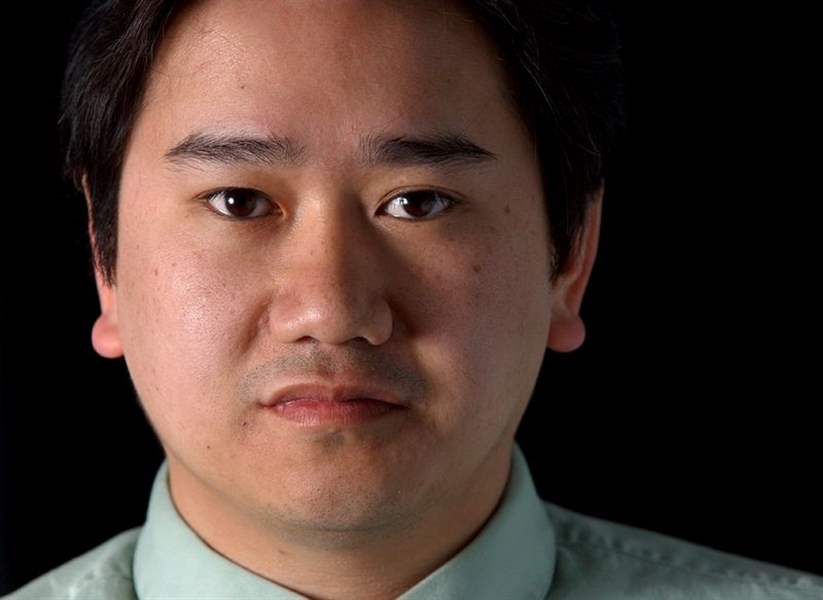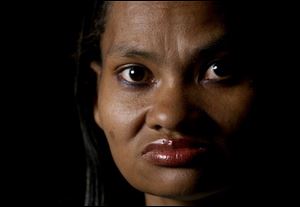
2 different Toledo-area lives born out of 1975's 'Operation Babylift'
4/30/2005
David Riethmiller
ruggiero

Selena Marie Jones
It's the tale of two Toledo-area lives born, in essence, 30 years ago out of "Operation Babylift," an effort by adoption workers to get thousands of children out of war-ravaged South Vietnam as Saigon fell to the North Vietnamese.
Selena Marie Jones, 35, an Owens Community College student who has lived in Toledo since 1999, on some nights still cries herself to sleep. "I have a lot of bad memories."
"People look at me and hear the way I talk and immediately make judgments, but they don't have any idea who I am and what I've been through," said Ms. Jones, who was 5 years old when she was placed aboard a plane by Holt International, a Eugene, Ore.-based, adoption agency operating in Vietnam.
Ms. Jones was part of the April 6, 1975, Babylift flight.
From what can best be determined, so was then-6-month-old David Riethmiller, who now is 30, a 1997 University of Toledo graduate who was raised in Sylvania and lives in Toledo with his wife, Rose, and their 18-month-old son, Maxwell.

David Riethmiller
"I was pretty accepted - got along with kids well, seemed to fit in," said Mr. Riethmiller, who is assistant manager of the Denver Mattress store on Monroe Street.
Ms. Jones, Mr. Riethmiller, and thousands of other children brought to the United States in the massive "Operation Babylift" effort in 1975 are part of the legacy of the war in Vietnam that unofficially ended 30 years ago today when the U.S. embassy in Saigon was overrun by the North Vietnamese as U.S. personnel and their South Vietnamese allies scrambled to leave.
Fearful about what would happen to South Vietnamese children in orphanages, President Gerald Ford on April 3, 1975, announced plans for Operation Babylift. Military and charter airplanes were used to take 3,300 children out of the country.
Organizations such as Holt International, Friends of Children of Viet Nam, Catholic Relief Services, and others aided in the effort, said Allison Martin, who runs Families with Children from Vietnam, a Raleigh, N.C.-based, parent-support agency.
"There was a lot of confusion because these things happened in a very short period of time," she said.
And perhaps because of that there was a tragedy. A U.S. Air Force jet, loaded with more than 300 passengers, mostly children - some just days old - crashed after takeoff from Saigon. More than 140 orphans and some of the adults accompanying them were killed.
Unlike Mr. Riethmiller, whose Vietnamese father died of a heart attack either just before or just after he was born and whose Vietnamese mother put him up for adoption because she could not afford to keep him, Operation Babylift is only part of Ms. Jones's story.
She is an Amerasian - her father was an African-American soldier; her mother was Vietnamese.
"The discrimination of Amerasians in Vietnam was considerable. That's why we felt it was so important to find families for those kids in the United States, where the diversity was much greater," said Glen Noteboom, a social worker with Holt who recently retired.
"They were considered children of the enemy," said Thomas Schwartz, a professor at Vanderbilt University in Nashville who has written a book on U.S. foreign policy and Vietnam. "You had these children who looked different than the others. They became the symbol of American abandonment."
Ms. Jones' dark skin almost hides her Asian features. An architecture major at Owens, her accent is still prominent, even though she has not been in Vietnam since 1975.
She said she has little memory of her mother and none of her father. But she said she remembers the screams of women and children and smelling the thick smoke from huts being burned to the ground.
She said life in the United States has not been easy. Ms. Jones was adopted by a family who lived in Flint, Mich., where she said she was abused. She ended up in numerous foster homes before moving in with relatives and friends before coming to Toledo.
Her adopted cousin, Michael Sykes, with whom Ms. Jones lived briefly in Toledo, said he remembers Ms. Jones looking different from the other kids, but it was never explained why.
"It wasn't until years later when I talked to her and when I found out about Vietnam and some of the things she's been through. I'm very proud of her to come through all of that and be so determined to get her education and get her degree," he said.
Dr. Robert McKelvey, a psychiatrist at Oregon Health and Science University's Doernbecher Children's Hospital, was a Marine who served in Vietnam. He has written a book on Amerasians called The Dust of Life: American Children Abandoned in Vietnam. He said Amerasians of African-American descent had the most difficult time finding acceptance.
"In Vietnam the darker your skin color was, there was this prejudice, even among their own," Dr. McKelvey said. "Here, they seemed to catch all the problems that other African-Americans would get, but African-Americans didn't see them as part of their group. So they got the downside without any of the benefits. Amerasians, in general, had to often go it on their own."
Ms. Jones said she is trying to channel her anger and pain by telling her story, earning her degree, and becoming a mother again to two daughters who are being cared for by others.
For Mr. Riethmiller, life has been much different.
He was adopted by Dr. Michael and Carol Riethmiller, who at the time lived in the New York City area where Dr. Riethmiller was doing his residency in occupational medicine.
They moved to Sylvania about 1979, and Mr. Riethmiller, who became a U.S. citizen when he was 7, attended the St. Francis Education Center at Lourdes College, McCord Junior High, and Southview High School before receiving his communication degree from UT.
He played football, baseball, and soccer; wrestled, and studied martial arts.
He and his wife are expecting their second child in October.
He has had what he describes as a "pretty meat and potatoes life."
He's thankful for the opportunities he's had in this country. "I'm appreciative of my parents a lot because I know what my life could have been. They are the foundation of who I am. They're my biggest role models," he said.
Contact Clyde Hughes at:
chughes@theblade.com
or 419-724-6095.